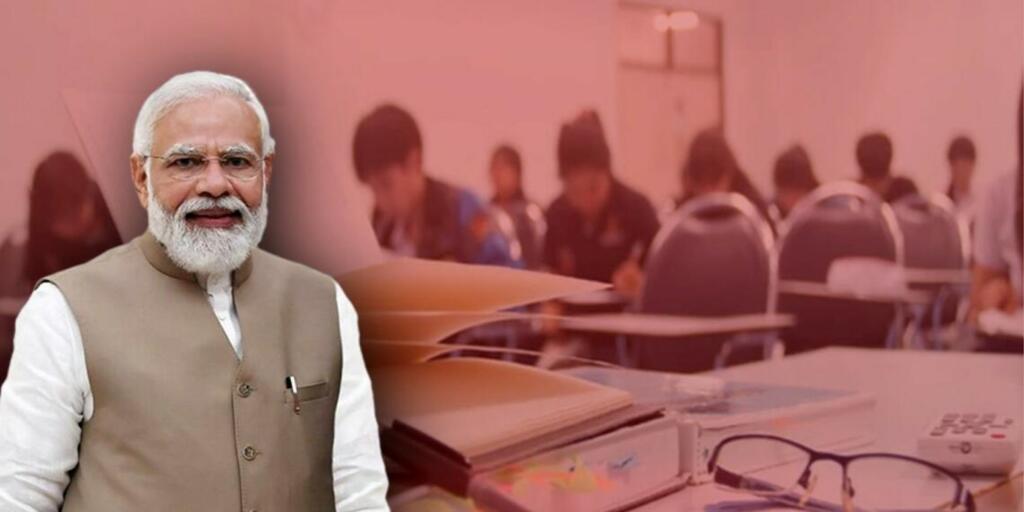The Preamble of the Indian Constitution categorically mentions that there should be Equality of Opportunity. This means that no one should be given any undue advantage over other citizens. However, the British adulterated education system created a huge disparity between the students of Central and State boards. It highly tilted the balance of scales towards students affiliated with CBSE or ICSE boards. Thankfully, the Modi government has brought sweeping changes to completely overhaul the education system across the nation. It has shown its commitment to bring in uniformity so as to end the huge disparity existing in the current education system.
PARAKH: Evaluating students with same yardsticks
The Modi government is soon going to end the hegemony of anglicised boards in the University admissions. As per a report in the Indian Express, the Modi government is planning to draft a “benchmark framework” that will assess students at the secondary and higher secondary level. This framework will bring “uniformity” across state and central boards. It will also end the wide disparities in scores which occurred courtesy of different standards of evaluation by different boards across the nation.
The proposed regulator will be known as Performance Assessment, Review and Analysis of Knowledge for Holistic Development acronymed as PARAKH. It will be a constituent unit of the NCERT. The regulator will be entrusted with the task of holding periodic learning outcome tests like the National Achievement Survey (NAS) and State Achievement Surveys (SAS). PARAKH will develop and implement “technical standards for the design, conduct, analysis and reporting” of tests at all levels of school education.
Also Read: The UP-education model that no one wants you to know about
The National Education Policy, 2020 envisaged that students focus on practical knowledge rather than rote learning. The proposed benchmark assessment framework will help in achieving this desired result of the NEP.
Earlier, the National Council of Educational Research and Training (NCERT) held a series of meetings with the representatives of state boards and State Councils of Educational Research and Training (SCERTs).
These meetings were held to come up with a common understanding to improve the education system as proposed by the NEP, 2020. The new assessment regulator, PARAKH, proposed to be set up in the immediate future is a result of deliberation from these expert meetings.
Proposals to hold Board Exams twice
Apart from setting up PARAKH, the experts agreed to make Board exams a biannual affair. In the expert meeting, the majority of the states endorsed the NEP proposal to hold board exams twice a year. This will include one exam for helping students improve their scores. States also agreed on a proposal to offer two types of papers on mathematics – a standard exam, and the other to test higher level competency. It will reduce the stress among students and encourage learning.
Also Read: India is moving towards a more centralized and transparent higher education system
An official of the Ministry of Education stated that the members in the meeting agreed on the NEP proposals to have two sets of question papers for most subjects – one will be in MCQs (multiple choice questions) format, and the other will be descriptive in nature.
Expression of Interest (EOI)
Earlier, the Centre invited bids to establish PARAKH. The EOI floated by the Centre described that PARAKH will be “setting norms, standards and guidelines for student assessment and evaluation for all recognised school boards of India, encouraging and helping school boards to shift their assessment patterns towards meeting the skill requirements of the 21st century”.
Also Read: India is rejecting Macaulay’s system of Education and there is nothing wrong with that
The EOI also stated that PARAKH will undertake the sample-based NAS, guide the state Achievement Surveys and monitor achievement of learning outcomes in the country. It stated that if things go as per plan, PARAKH will be able to conduct a NAS sample survey as early as 2024.
The EOI states, “Its (PARAKH) team will consist of leading assessment experts with a deep understanding of the education system in India and internationally. PARAKH will eventually become the national single-window source for all assessment related information and expertise, with a mandate to support learning assessment in all forms, both nationally and where applicable, internationally”.
PARAKH will end the disparity among students of different boards. As earlier, the students of state boards faced problems and were at disadvantage in comparison to their peers from CBSE or ICSE boards.
With all these progressive and reformist steps, India is finally getting rid of the Macaulian education system which was completely devoid of Indian civilisational values and had a heavy Western tilt. Finally with National Education Policy and frameworks like PARAKH, India is correcting the great Injustice done to our great civilisation which used to be a cradle of knowledge for centuries.
Support TFI:
Support us to strengthen the ‘Right’ ideology of cultural nationalism by purchasing the best quality garments from TFI-STORE.COM
